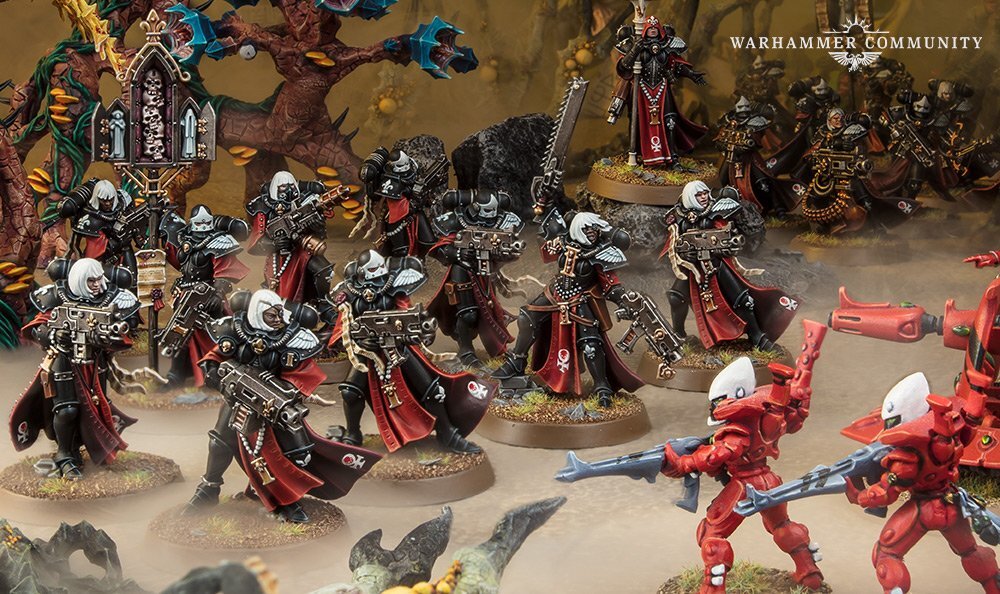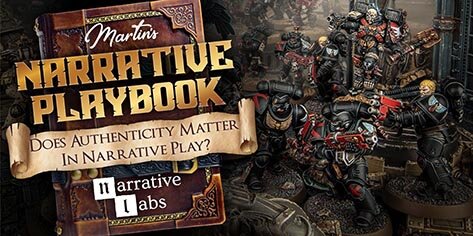What Makes A Good Narrative Play Scenario?
/Best Case Scenario is a new regular column written by Martin from Narrative Labs, reviewing narrative play scenarios, missions and battleplans for Warhammer 40,000, Age of Sigmar and more. Check out Narrative Labs on Twitch, Twitter and Facebook for the latest streaming times, and for some fantastic interactive narrative gaming.
Across the various Warhammer 40,000 and Age of Sigmar game books, there’s always one thing in particular that really captures my interest – narrative scenarios. Whether it’s a battleplan in the latest Age of Sigmar battletome or a Warhammer 40,000 campaign supplement full of narrative missions, I’m always eager to take a look at the latest scenario. In this series of articles, I’ll be reviewing newly released scenarios, as well as looking at some of my favourites from past publications.
In this first article, however, I’m going to set out my stall for what I look for in a new narrative scenario – what gets me excited, and what leaves me disappointed. These are the considerations that I have in my mind when I’m putting together a narrative campaign that will feature on Narrative Labs. I’m going to look at the narrative of the scenario, the mechanics it uses and how adaptable it is to other storytelling situations on the tabletop.
The first thing I look to understand is how the narrative of the scenario is reflected in the victory conditions. I often start at the end and look at the victory conditions first, as that gives me a good sense of the scenario overall. Of course, I sometimes get confused doing this, having not read key rules earlier in the text!
Some scenarios, while fun, are fairly generic in storytelling terms - for example, if they’re focused on a certain style of warfare like city fighting or siege games. Others are quite specific, representing a dramatic moment in a well-known storyline, or tailored to the lore and fighting style of a particular faction. Either way, what I look for is what the narrative objectives are for each side involved and how, mechanically, the players achieve these objectives. I’m looking to decide for myself if the objectives, the mechanics and the story all fit together effectively.
Here’s an example of what I mean; one common type of scenario is a ‘search and destroy’ or ‘search and rescue’ mission. In this type of mission, the two sides generally have opposing goals, with one player seeking to ‘destroy’ or ‘rescue’ an objective, and the other player seeking to stop them. When I review the victory conditions, I’m trying to decide if they’re an effective representation of the narrative intent. You would think this would be a fairly straightforward scenario type that’s hard to get wrong, but I’ve seen scenarios where you can score points just for searching, and potentially win the game even if you don’t actually achieve the second half of the mission – the destroy or rescue element. This is an example in which the victory conditions don’t match the narrative goals, and is something that really puts me off. If the narrative and victory conditions complement each other, that’s usually a good early indication that it’s a scenario I’m going to like.
Next, I go through the entire scenario and look for any new or interesting mechanics that stand out. Lots of scenarios introduce unique or unusual mechanics. Examples include rules on army composition, how armies are deployed, how reinforcements arrive, and unique actions that units can perform. Some introduce new command abilities or stratagems. All of these are designed to add flavour and help reflect some of the dramatic things that could happen in the narrative situation that’s being set up.
I like to consider the impact these special rules and unique mechanics will have on the game - from a narrative perspective of course! Do I think they’ll have the effect that the narrative suggests they should? Some of these mechanics can make a trivial difference to a scenario, while others can be absolutely key to making it more dramatic and narratively satisfying. When looking at these mechanics, I also like to think beyond the scenario as well – are these mechanics that could be taken and used elsewhere? Are they a valuable addition to my narrative toolbox? If they are, that adds value to the narrative scenario for me, and makes it all the more appealing.
This brings me neatly onto the final criteria by which I assess the quality of a narrative scenario, and something that’s especially important for me – how adaptable is the scenario? A lot of scenarios, as I already mentioned, are quite specific - but do they have to be played in that way in order to work?
There are a bunch of questions I usually ask myself. Do you have to use the factions the scenario is written for, or could you easily switch them for alternative factions? Can I replace the objectives with something different? If the protagonists are fighting over a fortified tower, can I swap it out for a realmgate or webway portal? If they’re searching for a lost artefact, could I make it a living being or character instead?
In some cases this isn’t easy. Some narrative scenarios really are designed for very specific combinations of factions, objectives and even units – for example, if it’s from a boxed starter set that’s been designed with two specific factions and a particular set of models in mind. Often a faction’s unique style of play means that the scenario really doesn’t translate very well. This is especially true when it comes to the super elite armies such as Sons of Behemat in Age of Sigmar or Imperial Knights in Warhammer 40K. However, more often than not there are ways the scenario (or at least parts of it) could be adapted and used for a very different type of story, and those are the scenarios that really excite me.
So those are the main things I look for when I review a scenario – hopefully you’ll see me put this into practice as I start publishing my reviews, starting with one of my all-time favourite Warhammer 40,000 scenarios in a few week’s time. In the meantime I’d love to know what makes a great narrative scenario for you, what your favourite scenarios are and why!
















